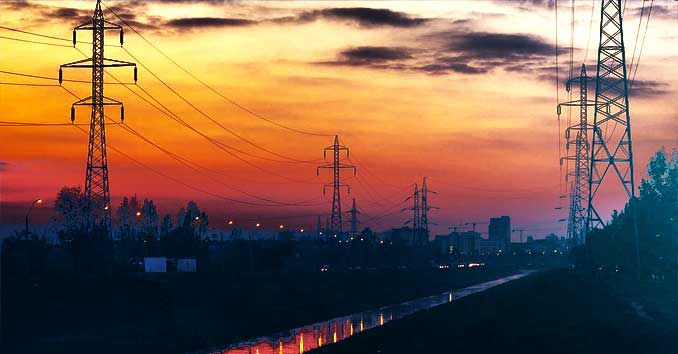DHS
Says Americans Need to Start Prepping for up to six months without
electricity!

10
December, 2018
In
a new report from the President’s National Infrastructure Advisory
Council and published by the Department of Homeland Security, the
government is urging the public to prepare for the up to six months
without electricity, transportation, fuel, money, and healthcare.
DHS
is warning that the electric grid is now the “prime target” of
terrorists, and says Americans need to be prepared for a power outage
of up to six months. The report says that “People no longer keep
enough essentials within their homes, reducing their ability to
sustain themselves during an extended, prolonged outage. We need to
improve individual preparedness.”
The report,
titled Surviving a Catastrophic Power Outage”, warns that an
attack would likely come with little to no notice and could cause
complete chaos for at least a half a year, “Long-duration,
lasting several weeks to months (at least 2 months, but more likely 6
months or more) due to physical destruction to equipment, such as
transformers or transmission lines; or the severity of the event
resulting in limited workforce to repair damage, or inability to
create or transport replacement parts,” said the report.
The
report recommends Americans have enough supplies on hand for a
minimum 14 days, a number that now seems grossly inadequate
considering the threat and the timeline for reestablishing essential
services after an attack.
“This profound risk requires a new national focus. Significant public and private action is needed to prepare for and recover from a catastrophic outage that could leave the large parts of the nation without power for weeks or months, and cause service failures in other sectors – including water and wastewater, communications, transportation, healthcare, and financial services — that are critical to public health and safety and our national and economic security,” said the advisory council.

“99 nuclear reactors would likely melt down without electricity to cool them”
The
report is the second in the last month to warn of a “profound
threat” to the U.S. electric grid from terrorism and events like a
solar storm or solar flare. A prior government
report also
recommended presidential action to protect the grid from attacks.
In
that report,
from the Air Force’s Air University, the military warned
an EMP-style
attack could
wipe out the United States, democracy, and the world order. They also
warned that:
- 99 nuclear reactors would likely melt down without electricity to cool them.
- 4.1 million would be displaced from areas around the nuclear plants as the radioactive cloud spread.
- Military and commercial jets, such as those built by Airbus, could be degraded. “Alarmingly, aircraft designed to carry large numbers of people and sizable cargo are allowed to operate without certainty about their level of resilience.”
- Bases would be cut off, making defense and counter-attacks impossible.
- Civil unrest would start in “hours.”
- Power and GPS could go dark. “An EMP would cause instantaneous and simultaneous loss of many technologies reliant on electrical power and computer circuit boards, such as cell phones and GPS devices.”
- “Failures may include long-term loss of electrical power (due to loss of emergency generators), sewage, freshwater, banking, landlines, cellular service, vehicles.”
- Eighteen months or more are required to replace key elements of the electric grid that would be damaged or knocked out.
What can you do to Prepare for an attack on our Power Grid?
In
my book, The
Ultimate Situational Survival Guide,
I devote a lot of time to this specific topic because I believe, as
detailed in these latest reports, our country’s emergency managers
have no real contingency plans to deal with this type of event. You
need to be prepared to survive an extended period without power,
without access to food and water, and without essential services –
hell, don’t take our word for it, the government is saying they
will not be able to help you!
You
need to be prepared to survive for an extended period of time without
power and essential services. This means stockpiling food and water,
learning the skills you need to protect yourself and your family from
the chaos and violence that will inevitably happen, and in my
opinion, you
need to get as far away from highly populated urban centers as
you can.
- Stock up on Food & Water: During a long-term grid-down situation, food and water will be crucial to your survival and will likely be the first things to go. Our entire food infrastructure is extremely reliant on the power grid; when the power goes down you are going to see widespread panic and chaos. Stock up on long-term food and water.
- Have cash on hand: During any type of grid down situation, your debit and credit cards are going to be useless. You need to have cash on hand to buy last minute supplies and to deal with the initial stages of the disaster.
- Start becoming more Self-Reliant: Over the last couple of decades the world has seen an unprecedented spike in technology and access to learning. Unfortunately, we’ve also seen a growing number of people who have used this technology to tune out and lose their ability to be self-reliant. To prepare for this danger, these 32 resources and skills are all things that you should know.
- Stock up on Firearms: During any type of long-term power outage, security is going to be a top priority. If the grid goes down for any length of time, chaos is going to quickly sweep the streets, and social unrest will be one of the top threats you face. The unprepared masses are going to be unpredictable; in all likelihood, they will become a threat to your safety.
- Stock up on Backup Power. Solar Chargers, power generators, and portable battery backupsare all things you need to invest in. For a very small amount of money, you can ensure you have the power to run things like emergency radios, ham radios, tablets, flashlights, and other emergency gear.



No comments:
Post a Comment
Note: only a member of this blog may post a comment.